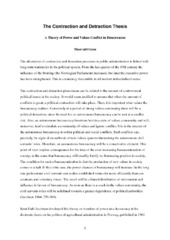The Contraction- and Detraction Thesis. A theory on power and values conflicts in democracies
Chapter, Peer reviewed
Published version
Permanent lenke
https://hdl.handle.net/1956/4606Utgivelsesdato
2005Metadata
Vis full innførselSamlinger
- Department of Government [457]
Sammendrag
The alternation of contraction and detraction processes in public administration is linked with long-term tendencies in the political system. From the last quarter of the 19th century the influence of the Storting (the Norwegian Parliament) increased, but later the executive power has been strengthened. This is a tendency discernible in all modern industrialized states. The contraction and detraction phenomena can be related to the amount of controversial political issues in the society. It would seem justified to assume that when the amount of conflicts is great, a political contraction will take place. Then, it is important what values the bureaucracy realizes. Conversely in a period of strong values community there will be a political detraction, since the need for an autonomous bureaucracy can be met at a smaller risk. Also, an autonomous bureaucracy functions best in a state of values community and will, moreover, tend to simulate a community of values and ignore conflict. It is in the interest of the autonomous bureaucracy to soften political and social conflicts. Such conflicts can, precisely, be signs of an outbreak of new values systems threatening the autonomous civil servants’ roles. Therefore, an autonomous bureaucracy will be a conservative element. This point of view implies consequences for the idea of the ever-increasing bureaucratization of society, in the sense that bureaucracy will steadily fortify its dominating position in society. The condition for such a bureaucratization is that the production of new values in society comes to a halt. If this is the case, the power chances of bureaucracy will increase: In the long run, professional civil servants can realize established values far more efficiently than can amateurs and voluntary forces. The result will be a biased distribution of information and influence in favour of bureaucracy. As soon as there is a crack in the values community, the civil servants roles will be redefined towards a greater dependence of political authorities (Jacobsen 1964: 259-260).
Beskrivelse
Kinesisk utgave 2006. Russisk utgave 2009.
Utgiver
FagbokforlagetOpphavsrett
FagbokforlagetCopyright Fagbokforlaget. All rights reserved. Reproduces with permission.
